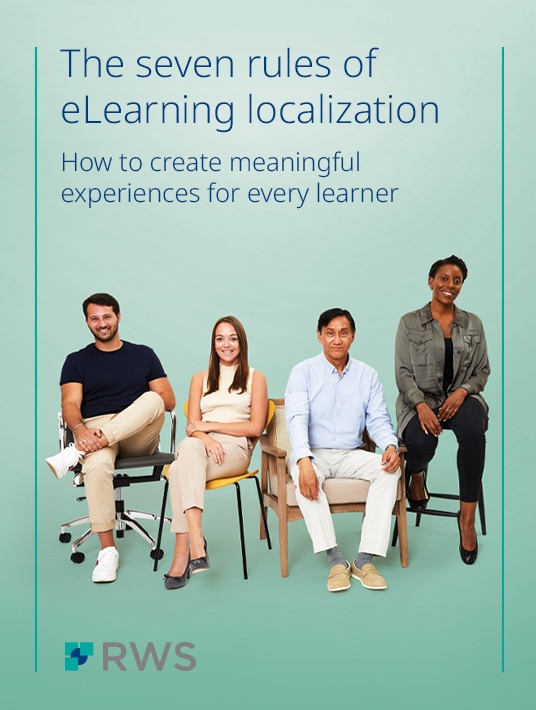What Is eLearning Localization, And What Are The Risks Of Taking A One-Size-Fits-All Approach?
Globalization has created opportunities that, for many businesses, simply wouldn't have been imaginable a few decades ago. Opportunities to enter distant markets, reimagine supply chains, off-shore operations, and more. But with those new opportunities come fresh challenges, especially for corporate learning and development teams. They find themselves tasked with training a global audience of learners, comprising employees, franchises, resellers, and dealers – individuals with a huge diversity in cultural background, frames of reference, and preferred language. And this raises a host of questions.
How do we effectively and consistently engage learners from very different cultures? How do we ensure they have a great experience that reinforces our brand values? How do we do it all with limited time and budgets? One solution is to create and deliver eLearning content that's been expertly localized to meet the specific needs of your audiences.

What We Mean By Localization
While translation aims to convey meaning in another language, localization goes further, striving to make it culturally and regionally relevant and relatable to its audience. For this reason, while translation typically restricts itself to words, localization expands to symbols, images, graphics, currencies, user interfaces, and more, and places all this into a cultural context. It also takes account of the differences in the way that learners behave, how they consume content, and how they prefer to learn.
The Benefits Of Localizing eLearning Content
When global organizations create localized eLearning content, individual learners benefit – but so does the business as a whole.
Better Learner Outcomes
Learners feel like content has been designed for them. They find it easy to understand and navigate, perceive greater clarity in the content, develop a better understanding, and engage with it more deeply. And they enjoy better outcomes.
Better Business Outcomes
When eLearning works for every learner, everywhere, organizations can build a better-trained and more knowledgeable workforce. At the same time, they can build their reputation as a future-ready global enterprise – helping them attract and retain top talent – and support their diversity, equity, and inclusion (DEI) endeavours with more accessible training and development.
The Dangers Of A One-Size-Fits-All Approach
When corporate training teams don't localize their content – the "one-size-fits-all" approach – the negative effects can be just as profound.
Diminished ROI
When eLearning content fails to communicate effectively and is open to being misunderstood, or if it fails to resonate with a percentage of its audience, then it won't fully deliver on the time and money invested in its creation and delivery. Worse, it can create additional costs as organizations are forced to invest further in retraining.
Increased Disengagement And Turnover
Trying to engage with eLearning content intended for learners with a different first language and cultural background is a frustrating experience. There can be a knock-on effect on productivity, employee morale, and talent retention, as staff feel they haven't been properly equipped to succeed in their roles.
Compliance And Safety Risks
Corporate eLearning content often helps employees understand how to perform their roles in a safe and compliant way. Without adequate localization, content can fail to reflect local laws and industry standards, leaving individuals in unsafe working situations and employers at risk of legal action.
Four Signs That You Should Seek A Localization Partner
If you're experiencing any of the following issues, it's definitely time to speak to an expert partner about how they can support your eLearning localization projects.
Low Engagement Rates
If your lowest levels of eLearning engagement and satisfaction are coming from your overseas learners – or those whose first language is different from the language used in the course – then that's a strong sign your localization efforts aren't sufficient and your content isn't resonating as it should.
Poor Learning Outcomes
Does it look like your learners are successfully completing your courses but aren't putting what they've learned into practice? This could signal a disconnect between your course content and the reality of their working lives.
An Inconsistent Brand Image
It's easy for localized content to become inconsistent and potentially confuse learners with its mixed messages and design styles. An expert localization partner will ensure your eLearning content accurately reflects your brand's visual aesthetic, messaging, and values without undermining its effectiveness across different audiences.
Overstretched Teams And Budgets
Many businesses initially attempt to manage eLearning localization in-house, only to find their staff and budgets increasingly stretched. If you notice that your learning and development team is getting overwhelmed, then bringing in a localization expert could allow your staff to focus on eLearning creation and curation and, ultimately, reduce your costs.
Great Localization Is Essential For Global Brands
It's hard to overstate the importance of localization when you're addressing a global audience of learners. Great localization lets you create engaging experiences for every learner, wherever they are – and, in turn, build a more successful global business.
Download The Seven Rules Of eLearning Localization today to explore the ins and outs of creating learning experiences that stick on a global scale.
